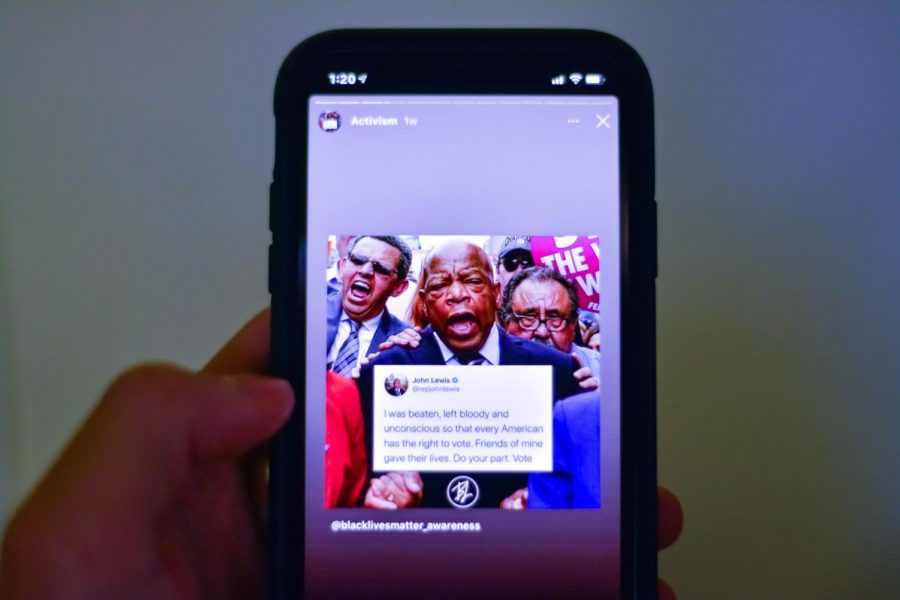After election, student activism shifts to be local, issue-driven
Many teenagers view social media as an avenue for activism and leadership, despite the fact that it can often turn performative.
May 3, 2021
Scrolling through Instagram, Santana Romero sees a graphic with information on how to help children detained at the U.S.-Mexico border. She shares it. Santana, a ninth grader, notices how different the content of her story is now compared to just six months ago during the heat of the election. Rather than post after post about getting out the vote, her posts call for action around the most important issues to her: immigration reform and police brutality.
This is just one example of how students, comforted by having President Joe Biden in office, have shifted their activism from frantic and political party-specific to more local and issue-driven.
“I’m optimistic because I know just from the get go, that he’s going to have more positive effects than Donald Trump,” Santana said about President Biden. “But I think that we should be cautious, because if we just assume things, then that’s when activism starts drifting and stops.”
Similar to Santana, senior Eliza Doss said the presidential transition of power brought a general sense of calmness and eased much of her constant stress about politics.
“I feel like I can go a day without checking the news about what terrible thing has happened, and what’s coming out and what tweet has been said,” Eliza said. “I feel like people our age, we don’t really remember much about Obama’s presidency, but it feels like we’re going back to normal where there isn’t a constant scandal going on.”
Comparative Politics teacher Christy Gerst said not only has she seen students be less anxious about the presidency, but they are also more focused on local and specific issues.
“Students are more zeroing in on issues, right? Rather than platforms,” Ms. Gerst said. “And it’s interesting about political participation, because a lot of it revolved around the election. So in a post-election environment, what does that mean? And so you see students in lots of different areas, some of which are related to school clubs, some of which are related to community organizations around Chicago, as well as issues that are central to Chicago.”
According to Santana, her advocacy using social media has become much more focused in this way.
“I think the danger is that Instagram can be very performative. And so I think before the presidency, it could be very effective because people were just trying to get the general message that, like, you need to go vote and you need to have your voice heard, and so then that was it,” Santana said. “But now you have to be much more focused about what you post about. It has to do more than an election graphic did, and you have to really care about it.”
Both Santana and Eliza believe it is important to make sure their Instagram graphics result in some sort of action.
Eliza said, “I want the things I repost to do something like helping educate people, or I’m very into election-based stuff, so letter writing and that kind of thing, just sharing the information.”
She added that simply sharing is not enough.
“Otherwise, it’s just sort of performative and ends up being the same kind of activism as only doing something to get into college,” she said.
To Santana, graphics that don’t cause someone to take action can often do more harm than good.
“Just showing, like, video clips of actual people of color, the injustice that is actually happening to them, I don’t think that’s very effective because I think that can also be very damaging mental health-wise,” Santana said.
According to Ms. Gerst, education-based activism is something she’s consistently seen with U-High students, but particularly now as her Comparative Politics classes students approach analysis of political action.
“What I see is a real openness to the education,” Ms. Gerst said. “They’re not quite aware of those public policy intricacies and have a real desire to be more knowledgeable. Right, so more of an openness, as opposed to a stance.”
Ms. Gerst said this interest and focus in politics is in the DNA of Lab students.
“It’s uniquely Lab. Throughout its history, Lab students have been at the vanguard of political expression, and that’s a right that’s afforded to them by the University of Chicago’s principles. Lab is like a century-plus institution, and having these kinds of focuses and conversations, it’s a big part of who we are.”




























































